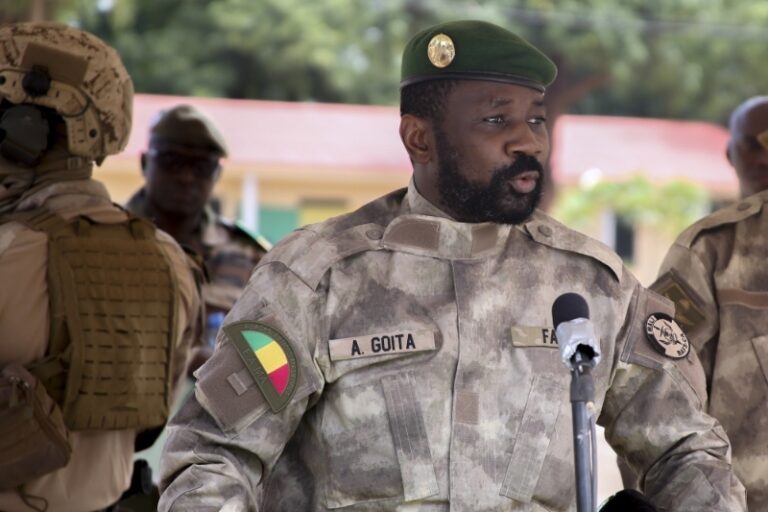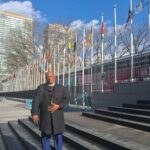Media reports confirm that Mali’s junta has arrested between 20 and 50 soldiers over the past few days for allegedly plotting to topple Colonel Assimi Goïta’s military government. Among those detained are:
- Gen. Abass Dembele, former governor of Mopti, respected for leadership in previous conflicts.
- Brig. Gen. Nema Sagara, one of Mali’s highest-ranking female officers in the Air Force.
Some sources cited up to 45–50 arrests, while others mention at least 20. Authorities have not issued an official statement, but the detentions are described as a response to attempts at “destabilization.”
The arrests in Mali for allegedly plotting to topple the junta — especially involving someone like General Abass Dembélé — suggest several important signals:
1. Internal fractures within the ruling military bloc
- The Malian junta, led by Assimi Goïta, came to power through its own coups (2020 and 2021). If credible coup plots are emerging, it means dissatisfaction has reached even the military elite, not just civilians or opposition politicians.
- The fact that the alleged conspirators include a respected officer and former governor indicates serious dissent from experienced figures rather than a fringe rebellion.
2. Possible ethnic or regional dimension
- Abass Dembélé is from Mopti, a central region of Mali with mixed Fulani, Bambara, and Dogon populations.
- If the discontent has a Fulani connection (one of the largest ethnic groups, with strong presence in central Mali), it could draw in grievances about the junta’s handling of ethnic conflicts and counterinsurgency operations in the Sahel.
- He attempted toppling of Mali’s junta now is the result of several overlapping pressures that have converged in mid-2025, creating a window for dissent inside the military and among certain political-military elites:
1. Declining legitimacy of the junta
Prolonged transition delays – The military government has repeatedly postponed promised elections, frustrating both the political class and parts of the army who initially supported the 2020 and 2021 coups expecting a quicker civilian transition.
Economic hardship – Rising food prices, reduced international aid, and disrupted trade have eroded public trust.
Security setbacks – Despite promises to defeat jihadist groups, violence in the north and center (including Mopti) persists or worsens.
2. Internal military dissatisfaction
Factionalism within the army – Rivalries between officers aligned with Assimi Goïta and those marginalized in recent reshuffles have deepened.
Marginalized regions – Figures like General Abass Dembélé (from Mopti) represent constituencies feeling sidelined in decision-making and military appointments.
Personal grievances – Officers with long service records may resent younger coup leaders’ dominance and their prioritization of personal networks over merit.
3. Growing ethnic and regional tensions
The Bambara-dominated core of the junta risks alienating officers from Fulani (Peul) or other ethnic groups, particularly in central Mali, where conflict with jihadists and communal militias is acute.
Dembélé’s base in Mopti—a multi-ethnic, strategic region—makes his arrest politically sensitive and potentially a rallying point for opposition.
4. Foreign influence and timing
Loss of French/Western presence has left Mali heavily dependent on Russia’s Wagner (now “Africa Corps”), but some factions see this alignment as overreliance on a single foreign patron.
Regional context – The coup attempt comes amid instability in Niger, Burkina Faso, and Chad, where military governments face their own legitimacy crises. Success in one could inspire or trigger moves in another.
Possible external encouragement – Some regional or diaspora actors may see now as the moment to push for leadership change before Mali’s junta fully entrenches itself and before Wagner strengthens its grip.
5. Why now specifically
Transitional promises expiring – June–July 2025 was floated as a period for some progress toward elections; no tangible steps have materialized.
Security failures – Recent attacks in central Mali embarrassed the military leadership.
Rumored internal purges – Reports suggest Goïta may have been preparing to sideline older generals, prompting a “move before being moved” logic among rivals.
3. Implication for security and governance
- Mali is already overstretched fighting jihadist insurgencies linked to al-Qaeda and ISIS. A coup attempt — even if unsuccessful — will undermine morale, distract forces from operations, and create opportunities for militant groups to expand.
- Such instability can further delay the already-postponed transition to civilian rule.
4. Foreign influence and proxy dynamics
- Mali’s junta is strongly backed by Russia (Wagner / Africa Corps) and has distanced itself from France and ECOWAS.
- If the coup plotters have any ECOWAS, Western, or internal anti-Russian alignment, Moscow will likely push for a hard crackdown to preserve its foothold.
- Conversely, some actors in ECOWAS might see this as a chance to replace the junta with a government more open to cooperation.
5. Russia’s likely reaction
- Expect increased Russian security support for the junta:
- Intelligence sharing to detect further plots.
- Deployment of Wagner/Africa Corps operatives to key bases and the capital.
- Intensified propaganda portraying the junta as a victim of “foreign destabilization.”
- Russia will want to ensure that its access to Malian resources (gold, military contracts, influence in the Sahel) remains secure.
6. Probability of success
- In the short term, low to moderate — because the junta still controls the army command structure, has Russian support, and is not yet fragmented enough to allow a rapid takeover.
- However, repeated coup plots signal long-term vulnerability: each attempt erodes trust inside the armed forces and forces Goïta to rely more heavily on a narrow loyalist circle, making him politically isolated.
Verification Discrepancies
- Family and associates of Dembele told the BBC he was not arrested and was “doing well.”
Implications for Analysis
- Internal Fractures Confirmed
- The detention of high-ranking, respected officers indicates sharp tensions within the elite military hierarchy.
- A faction may be using dissatisfaction with battlefield setbacks, reliance on Russian mercenaries, or stalled political transition as leverage.
- Coup Protection Measures
- The junta is likely targeting structural leverage points—military regions like Mopti (key to control of center), key senior officers, and media gatekeepers.
- Battlefront Impact
- If Dembele led troops in Mopti previously, his detention could weaken northern defensive postures and open tactical corridors to insurgent groups.
- Russia’s Role
- The arrests likely signal Moscow to continue backing Goïta.
- If Russia perceives Dembele as a rival connected to Western-leaning networks—or capable of reorienting command—swift action would be expected.
Summary Update
| Element | Updated Insight |
| Arrest Scale | 20–50 soldiers detained, including at least two generals |
| Key Figures | Gen. Abass Dembele, Brig. Gen. Nema Sagara suspected of coup involvement |
| Junta Response | No formal statement; detentions framed as preemptive arrests for destabilization |
| Internal Signal | Confirms elite-level contention over security failures and political paralysis |
| Battlefield Risks | Potential shake-up in Mopti and wider command chain could embolden insurgents |
| Moscow Implication | Reinforces junta reliance on Russian security support |
Attempt to Overthrow Mali’s Military Government – Analysis
1. Key Actors Behind the Coup Attempt
- Primary suspect:
- General Abass Dembélé – former governor of Mopti region, respected within the Malian army and among local communities, especially the Bambara majority.
- Known for his pragmatism, operational efficiency, and personal networks in the central and northern regions.
- His removal from an influential position was perceived by some as a purge by the junta against officers not fully aligned with its policies.
- Possible supporters within the armed forces:
- Mid-ranking officers dissatisfied with poor pay, corruption, and the concentration of power in the hands of Colonel Assimi Goïta and his inner circle.
- Veterans of previous anti-jihadist operations, many of whom resent the replacement of French military support with the Wagner Group.
- Potential civilian elements:
- Disgruntled political elites excluded from transitional structures.
- Ethnic leaders from regions marginalized by the junta’s policies.
2. Motivations for the Coup Attempt
- Military frustration with worsening security in central Mali and the north despite Russian/Wagner assistance.
- Opposition to junta’s authoritarian consolidation and prolonged transition without elections.
- Economic pressure due to sanctions, reduced aid, and inflation.
- Ethnic representation concerns, particularly if key groups feel sidelined in military promotions and governance.
3. Ethnic Dynamics
- The Bambara ethnic group (largest in Mali) dominates the officer corps, but there are growing frictions with Tuareg and Fulani officers.
- General Dembélé’s roots and influence in Bambara-majority areas could have made him a rallying point for dissatisfied Bambara officers.
- In contrast, Fulani and Tuareg elements may remain neutral or side with the junta if they fear a Bambara-dominated coup.
4. Probability of Success
- Short-term (low probability) – The junta still has strong loyalty from elite units in Bamako and tight Russian/Wagner security integration.
- Arrests suggest intelligence penetration into coup networks before plans could be executed.
- However, if security and economic situations continue to deteriorate, the medium-term probability of another, more organized coup rises.
5. Potential Supporters
- Regional actors:
- ECOWAS is unlikely to directly support a coup but could quietly welcome the removal of a hardline anti-Western junta.
- France and some EU states could see an opening to restore influence and security cooperation.
- Algeria may remain cautious, prioritizing stability over regime change.
- Domestic support:
- Urban middle class frustrated with isolation from the West.
- Former political parties excluded from power since the 2021 coup.
6. Consequences if Coup Succeeds
- Security: Potential realignment toward France and ECOWAS rather than exclusive reliance on Russia/Wagner.
- Foreign relations: Aid and training from EU and U.S. could resume, but only if a credible democratic transition is promised.
- Ethnic balance: Risk of inter-ethnic friction if the new leadership is perceived as favoring one group.
- Terrorism fight: Possible operational improvement if coup leaders are experienced commanders.
7. Russia’s Reaction
- Moscow would likely react strongly, given Mali is one of its key African security footholds.
- Wagner forces might:
- Directly protect the junta’s leadership.
- Assist in tracking and neutralizing coup plotters.
- Increase surveillance and infiltration in the army.
- Russia could also use disinformation campaigns portraying the coup as a Western intelligence plot.
8. Overall Risk Assessment
- Current threat to junta: Contained but real. Arrests show early detection, yet also confirm that dissent exists within senior ranks.
- Risk trend: Upward if economic hardship and battlefield losses continue.
- Geopolitical stakes: Any coup in Mali would test Russia’s African strategy, as it would signal the vulnerability of its client regimes to internal fractures.
Given the arrests in Mali — especially of General Abass Dembélé — there are three main scenarios for what could happen next, each with different implications for the junta, the army, and foreign actors.
1. Consolidation of the Junta’s Power (Most likely in the short term)
- Description:
- Goïta uses the arrests to purge suspected rivals in the army and tighten control over promotions, commands, and access to weapons.
- Wagner/Africa Corps intensifies its protection of junta leaders and intelligence monitoring inside the armed forces.
- Public narrative: The government accuses “foreign-backed traitors” (likely implying ECOWAS or France) to justify repression.
- Consequences:
- Short-term stability for the junta but deepened mistrust in the officer corps.
- More power concentrated in a small loyalist network, increasing the risk of authoritarian isolation.
- Greater dependence on Russian military and political backing.
2. Silent Splintering Inside the Military (Medium-term risk)
- Description:
- Other officers, fearful after the arrests, go underground but continue plotting.
- Discontent spreads through mid-ranking commanders in regions like Mopti, Gao, or Timbuktu, especially if they feel sidelined or see corruption worsening.
- Some defectors may quietly reach out to ECOWAS or France for discreet backing.
- Consequences:
- Army cohesion erodes, making coordinated anti-jihadist operations harder.
- Local commanders may act semi-independently, creating “zones of autonomy” that weaken Bamako’s authority.
- Risk of a slow-burn mutiny instead of a sudden coup.
3. Renewed Coup Attempt (Lower probability but high impact)
- Description:
- If enough disaffected officers believe the junta is vulnerable or unpopular, they could attempt a swift power grab in Bamako.
- Likely tactics:
- Seizing the presidential palace and national TV/radio.
- Controlling key bridges and road access from the airport.
- Blocking Wagner reinforcements from arriving quickly.
- The plotters could present themselves as “restoring civilian rule” to win ECOWAS and international support.
- Consequences:
- Could trigger a counter-coup with heavy fighting between loyalists, rebels, and Russian operatives.
- If successful, could lead to a transitional government — but risk further instability and reprisals.
- Foreign powers (ECOWAS, Russia, possibly Algeria) would scramble to shape the outcome.
Factors that will influence which scenario happens:
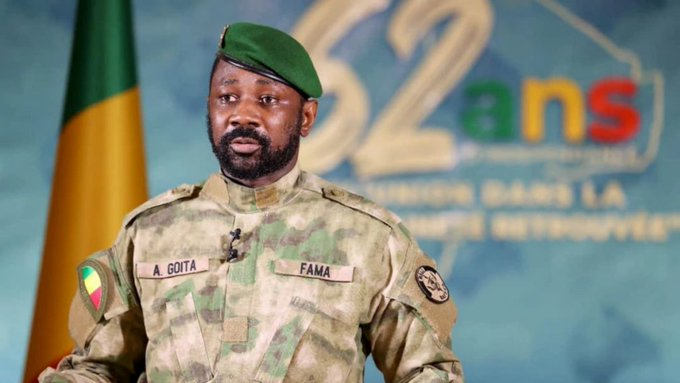
More on this story: Mali Junta Leader Gets Backing to Serve as President Until 2030
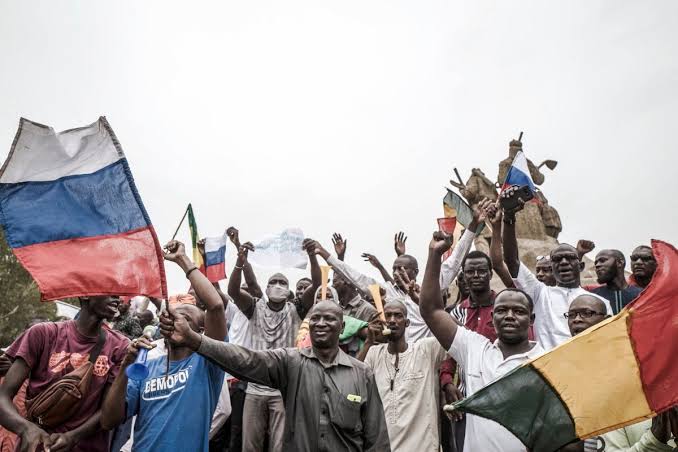
More on this story: Russia’s Influence Operations in Mali: Strategic Assessment
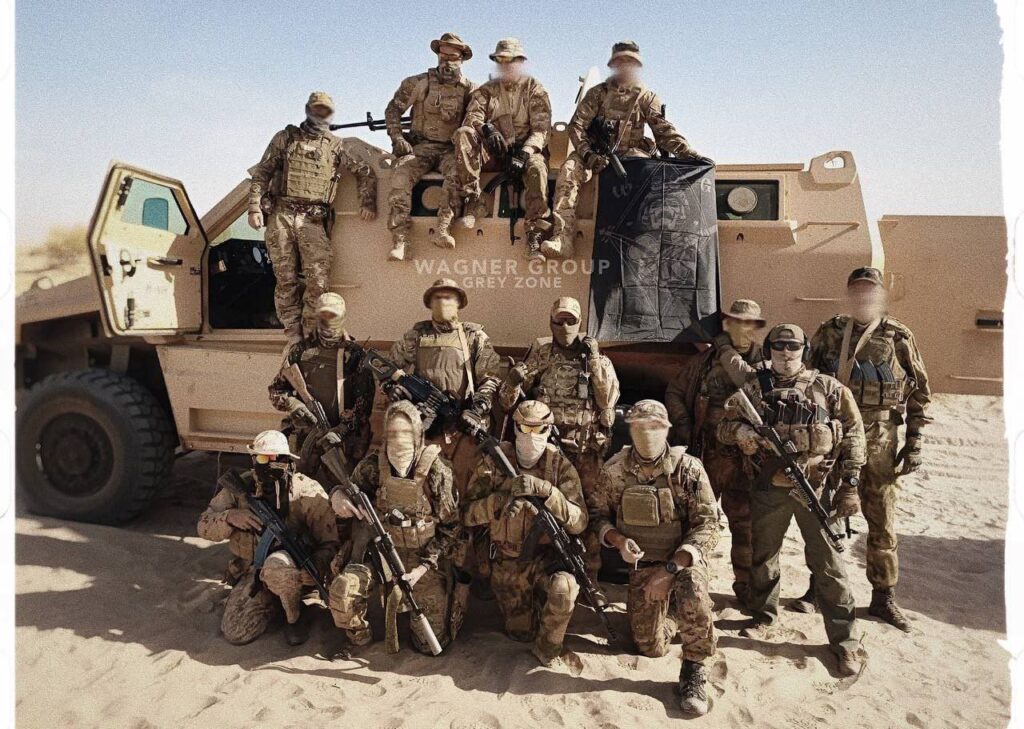
- How far the junta goes in purging officers — heavy-handed repression may push more of them toward rebellion.
- Russia’s commitment level — if Moscow treats Mali as strategically essential, it will actively prevent any coup, making success very hard.
- Regional pressure — ECOWAS sanctions or diplomatic isolation could embolden anti-junta officers.
- Economic conditions — worsening living standards and inflation could erode public support for Goïta, creating a political opening.


